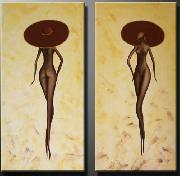|
|
Michelangelo Buonarroti
ID: 62902
The Brazen Serpent
new21/Michelangelo Buonarroti-443992.jpg
1511 Fresco, 585 x 985 cm Cappella Sistina, Vatican The scenes painted in the pendentives at the sides of prophet Jonah are characterized by the use of pronounced foreshortening. This is the case with the tangled group of Israelites who, in the scene of the Brazen Serpent, writhe in the throes of death, and, above all, with the crucified figure of Haman in the Punishment of Haman. In the Brazen Serpent, the mass of bodies poisoned by the snakes occupies the whole of the right part, spreading toward the center. The survivors are grouped on the left, eyes and arms turned imploringly toward the salvafic image of the brazen serpent. The cruel punishment of the Israelites for having spoken against God and Moses occupies a large part of the pendentive, with bodies intertwined in an indescribable tangle. This presented the artist with an opportunity for virtuosic foreshortening and twisting of the bodies, and also depicting contorted, screaming faces. Much admired by Vasari, the group is a striking forerunner of the spectacular motifs that were, in the following decades, typical of the current of Mannerism comprising Giulio Romano and Vasari himself. The Biblical story (Num. 21 :4-9) The Israelites, discontented with life in the desert, spoke out against God and Moses. They were punished with a plague of poisonous snakes which only increased their hardships. Many died of snakebite. When the people repented, Moses sought God's advice how they should be rid of the snakes. He was told to make an image of one and set it on a pole. Whoever was bitten would be cured when he looked upon the image. Moses accordingly made a serpent of brass on a tau-shaped (T) pole, which proved to have a miraculous curative effect. Representation in Art The Israelites are depicted writhing on the ground, their limbs entwined by snakes. Moses, sometimes with Aaron, stands beside the brazen serpent. John's gospel furnishes the typological parallel: 'This Son of Man must be lifted up as the serpent was lifted up by Moses in the wilderness.' Medieval art juxtaposed the subject with the serpent in the Garden of Eden entwining the Tree of Knowledge. Both probably derive from an ancient and widespread fertility image, the 'asherah', associated with the worship of Astarte, which consisted of a snake and a tree representing respectively the male and female elements. King Hezekiah destroyed the asherah, by inference the one made by Moses, at a time when the Israelites were relapsing into idolatry (II Kings 18:4). The presence and the identification of Moses in Michelangelo's fresco is debated. Artist: MICHELANGELO Buonarroti Title: The Brazen Serpent Date: 1501-1550 Italian , painting : religious
Buy Only Oil Painting

|

ORIGINALS
BACK
|
|

